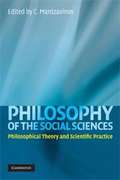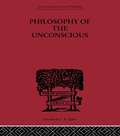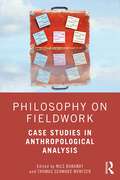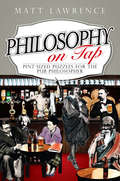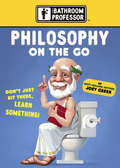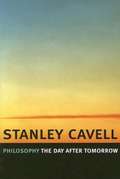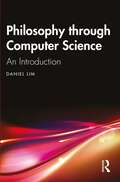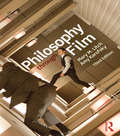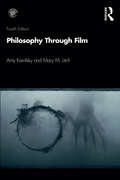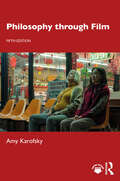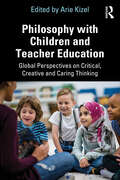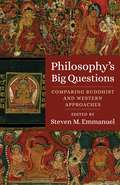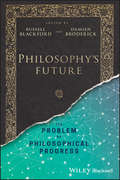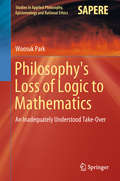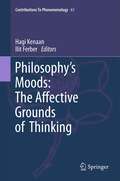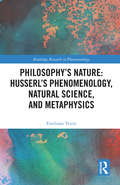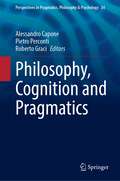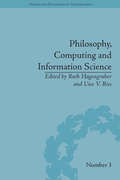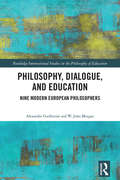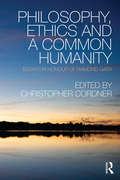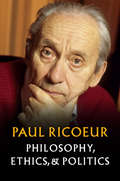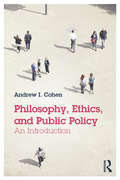- Table View
- List View
Philosophy of the Social Sciences: Philosophical Theory and Scientific Practice
by C. MantzavinosThis volume is a unique contribution to the philosophy of the social sciences, presenting the results of cutting-edge philosophers' research alongside critical discussions by practicing social scientists. The book is motivated by the view that the philosophy of the social sciences cannot ignore the specific scientific practices according to which social scientific work is being conducted, and that it will be valuable only if it evolves in constant interaction with theoretical developments in the social sciences. With its unique format guaranteeing a genuine discussion between philosophers and social scientists, this thought-provoking volume extends the frontiers of the field. It will appeal to all scholars and students interested in the interplay between philosophy and the social sciences.
Philosophy of the Unconscious: Speculative Results According To The Inductive Method Of Physical Science (classic Reprint) (International Library of Philosophy #Vol. 4)
by Eduard Von HartmannThis is Volume VII of eight in a series on the Philosophy of Mind and Language. Originally published in 1931, this book presents Speculative Results according to the Inductive Method of Physical Science. Interest in Hartmann’s conception of the Unconscious until the beginning of the present century was primarily metaphysical; his treatise was merely the first, and most significant, of the thirty volumes which set forth his “system.”
Philosophy on Fieldwork: Case Studies in Anthropological Analysis
by Nils BubandtHow do we teach analysis in anthropology and other field-based sciences? How can we engage analytically and interrogatively with philosophical ideas and concepts in our fieldwork? And how can students learn to engage critical ideas from philosophy to better understand the worlds they study? Philosophy on Fieldwork provides "show-don’t-tell" answers to these questions. In twenty-six "master class" chapters, philosophy meets anthropological critique as leading anthropologists introduce the thinking of one foundational philosopher – from a variety of Western traditions and beyond – and apply this critically to an ethnographic case. Nils Bubandt, Thomas Schwarz Wentzer and the contributors to this volume reveal how the encounter between philosophy and fieldwork is fertile ground for analytical insight to emerge. Equally, the philosophical concepts employed are critically explored for their potential to be thought "otherwise" through their frictional encounter with the worlds in the field, allowing non-Western and non-elite life experience and ontologies to "speak back" to both anthropology and philosophy. This is a unique and concrete guidebook to social analysis. It answers the critical need for a "how-to" textbook in fieldwork-based analysis as each chapter demonstrates how the ideas of a specific philosopher can be interrogatively applied to a concrete analytical case study. The straightforward pedagogy of Philosophy on Fieldwork makes this an accessible volume and a must-read for both students and seasoned fieldworkers interested in exploring the contentious middle ground between philosophy and anthropology.
Philosophy on Tap: Pint-Sized Puzzles for the Pub Philosopher
by Matt LawrenceWhen beer starts to flow, philosophical discussions naturally follow. Philosophy on Tap takes pub philosophy to the next level, pairing 48 of life's greatest philosophical questions with 48 of the world's best beers. Features a unique presentation of philosophical puzzles, paradoxes, and debates by considering 48 of life's biggest questions in the context of 48 distinctive beers from around the world Provides a highly engaging and sociable approach to the classic philosophical problems as well as a unique look at the conundrums that directly affect the beer drinker Combines a philosopher's insights with thematic humor and trivia to explore issues such as free will, God's existence, the nature of the soul, time travel, the aesthetics of taste, the role of beer in the good life, and the infamous "beer goggles" paradox For beer drinkers who enjoy philosophy, philosophers who enjoy beer, and anyone who has ever pondered the meaning of life over a pint of ale
Philosophy on the Go
by Joey GreenWe may be a society perpetually on-the-go, but we’ve still got a little downtimewhenwe go. In just a few short sittings,The Bathroom Professor(TM) series helps make any reader a scintillating cocktail party guest, successful game show contestant, or basic, well-rounded person. This debut title,Philosophy on the Go, introduces all the great philosophers through the ages, from Socrates to Sartre. Wildly entertaining, the fun and informative lessons delve into the philosophies of ancient and moderns alike, and confirm once and for all that Kierkegaard is not a brand of deodorant. Always wanted to brush up your knowledge on life’s biggest philosophical questions? You’re just a few rest stops away from having all the answers.
Philosophy on the Go
by Joey GreenWe may be a society perpetually on-the-go, but we've still got a little downtime when we go. In just a few short sittings, The Bathroom Professor(TM) series helps make any reader a scintillating cocktail party guest, successful game show contestant, or basic, well-rounded person. This debut title, Philosophy on the Go, introduces all the great philosophers through the ages, from Socrates to Sartre. Wildly entertaining, the fun and informative lessons delve into the philosophies of ancient and moderns alike, and confirm once and for all that Kierkegaard is not a brand of deodorant. Always wanted to brush up your knowledge on life's biggest philosophical questions? You're just a few rest stops away from having all the answers.
Philosophy on the Go
by Joey GreenWe may be a society perpetually on-the-go, but we’ve still got a little downtime when we go. In just a few short sittings, The Bathroom Professor(TM) series helps make any reader a scintillating cocktail party guest, successful game show contestant, or basic, well-rounded person. This debut title, Philosophy on the Go, introduces all the great philosophers through the ages, from Socrates to Sartre. Wildly entertaining, the fun and informative lessons delve into the philosophies of ancient and moderns alike, and confirm once and for all that Kierkegaard is not a brand of deodorant. Always wanted to brush up your knowledge on life’s biggest philosophical questions? You’re just a few rest stops away from having all the answers.
Philosophy the Day after Tomorrow
by Stanley CavellCavell presents essays that explore the meaning of grace and gesture in film and on stage, in language and in life, from Astaire to Shakespeare's soulful Cordelia.
Philosophy through Computer Science: An Introduction
by Daniel LimWhat do philosophy and computer science have in common? It turns out, quite a lot! In providing an introduction to computer science (using Python), Daniel Lim presents in this book key philosophical issues, ranging from external world skepticism to the existence of God to the problem of induction. These issues, and others, are introduced through the use of critical computational concepts, ranging from image manipulation to recursive programming to elementary machine learning techniques. In illuminating some of the overlapping conceptual spaces of computer science and philosophy, Lim teaches readers fundamental programming skills and allows them to develop the critical thinking skills essential for examining some of the enduring questions of philosophy. Key Features Teaches readers actual computer programming, not merely ideas about computers Includes fun programming projects (like digital image manipulation and Game of Life simulation), allowing the reader to develop the ability to write larger computer programs that require decomposition, abstraction, and algorithmic thinking Uses computational concepts to introduce, clarify, and develop a variety of philosophical issues Covers various aspects of machine learning and relates them to philosophical issues involving science and induction as well as to ethical issues Provides a framework to critically analyze arguments in classic and contemporary philosophical debates
Philosophy through Film
by Mary M. Litch Amy KarofskyMany of the classic questions of philosophy have been raised, illuminated, and addressed in celluloid. In this Third Edition of Philosophy through Film, Mary M. Litch teams up with a new co-author, Amy Karofsky, to show readers how to watch films with a sharp eye for their philosophical content. Together, the authors help students become familiar with key topics in all of the major areas in Western philosophy and master the techniques of philosophical argumentation. The perfect size and scope for a first course in philosophy, the book assumes no prior knowledge of philosophy.? It is an excellent teaching resource and learning tool, introducing students to key topics and figures in philosophy through thematic chapters, each of which is linked to one or more "focus films" that illustrate a philosophical problem or topic. Revised and expanded, the Third Edition features: A completely revised chapter on "Relativism," now re-titled "Truth" with coverage of the correspondence theory, the pragmatist theory, and the coherence theory. The addition of four new focus films: Inception, Moon, Gone Baby Gone, God on Trial. Revisions to the General Introduction that include a discussion of critical reasoning. Revisions to the primary readings to better meet the needs of instructors and students, including the addition of three new primary readings: excerpts from Bertrand Russell’s The Problems of Philosophy, from William James’ Pragmatism: A New Way for Some Old Ways of Thinking, and from J. L. Mackie’s "Evil and Omnipotence". Updates and expansion to the companion website, including a much expanded list of films relevant to the various subfields of philosophy. Films examined in depth include:? Hilary and Jackie The Matrix Inception Memento Moon I, Robot Minority Report Crimes and Misdemeanors Gone Baby Gone Antz Equilibrium The Seventh Seal God on Trial Leaving Las Vegas
Philosophy through Film
by Mary M. Litch Amy KarofskyIn Philosophy through Film, Amy Karofsky and Mary M. Litch use recently released, well-received films to explore answers to classic questions in philosophy in an approachable yet philosophically rigorous manner. Each chapter incorporates one or more films to examine one longstanding philosophical question or problem and assess some of the best solutions that have been offered to it. The authors fully integrate the films into their discussion of the issues, using them to help students become familiar with key topics in all major areas of Western philosophy and master the techniques of philosophical argumentation. Revised and expanded, changes to the Fourth Edition include: A brand new chapter on the mind-body problem (chapter 4), which includes discussions of substance dualism, physicalism, eliminativism, functionalism, and other relevant theories. The replacement of older movies with nine new focus films: Ad Astra, Arrival, Beautiful Boy, Divergent, Ex Machina, Her, Live Die Repeat: Edge of Tomorrow, A Serious Man, and Silence. The addition of two new primary readings to the appendix of source materials: excerpts from Patricia Smith Churchland’s, "Can Neurobiology Teach Us Anything about Consciousness?" and Frank Jackson’s "What Mary Didn’t Know." The inclusion of a Website, with a Story Lines of Films by Elapsed Time for each focus film. The films examined in depth are: Ad Astra, Arrival, Beautiful Boy, Crimes and Misdemeanors, Divergent, Equilibrium, Ex Machina, Gone Baby Gone, Her, Inception, Live Die Repeat: Edge of Tomorrow, The Matrix, Memento, Minority Report, Moon, A Serious Man, Silence
Philosophy through Film
by Amy KarofskyThis fifth edition of Philosophy through Film uses recently released, well-received movies to explore answers to classic questions in philosophy in an approachable yet philosophically rigorous manner. Author Amy Karofsky uses two films in each chapter to examine one long-standing philosophical question and assess some of the best solutions to it that have been offered. The chosen movies are not mere “add-ons” to an otherwise straightforward introductory text; instead, they are fully integrated into the discussion of the issues and the various positions. Each chapter also includes discussion questions, an annotated list of films related to the chapter topic, and two or three historically significant primary sources (which are collected together at the end of the book).Changes to the fifth edition include: The replacement of older movies with four new focus films: Anatomy of a Fall, Everything Everywhere All at Once, Get Out, and The Time Traveler’s Wife. The addition of new primary readings from Roderick Chisholm, Jerry Fodor, Baron d’Holbach, and Susan Wolf. Important new sections added to Chapter 1 on Truth (“The Identity Theory of Truth”) and Chapter 5 on Artificial Intelligence (“The I in AI”). A major overhaul of Chapter 6 on free will, determinism, and moral responsibility. Updated notes throughout. The films examined in depth are: Ad Astra; Anatomy of a Fall; Arrival; Beautiful Boy; Crimes and Misdemeanors; Divergent; Equilibrium, Everywhere Everything All at Once; Ex Machina; Get Out; Gone Baby Gone; Her; Inception; Edge of Tomorrow; The Matrix; Memento; A Serious Man; Silence; The Time Traveler’s Wife.For a collection of Story Lines of the Discussed Films by Elapsed Time, visit: www.routledge.com/9781032544595
Philosophy with Children and Teacher Education: Global Perspectives on Critical, Creative and Caring Thinking
by Arie KizelThis rich collection of essays offers a broad array of perspectives from prominent international ‘philosophy for/with children’ (P4wC) scholars and practitioners regarding the interface between P4wC and teacher education and training curricula. The book considers the deep and varied points of contact that exist between the pedagogical and philosophical principles of the philosophical community of inquiry and teacher education and training programs. It is designed to help improve education systems worldwide as they seek to shift their attention towards the student, student inter-relations, and student-other relations and foster independent high-order, critical, creative, and caring thinking within democratic, pluralistic societies. It proposes an innovative, creative way of approaching teacher education and training—a central subject in today’s educational world. Offering diverse perspectives on integrating progressive educational philosophy and contemporary pedagogy, Philosophy with Children and Teacher Education is a must-read for all those studying philosophy for/with children and researching in this area.
Philosophy's Artful Conversation
by D. N. RodowickTheory--an embattled discourse for decades--faces a new challenge from those who want to model the methods of all scholarly disciplines on the sciences. What is urgently needed, says D. N. Rodowick, is a revitalized concept of theory that can assess the limits of scientific explanation and defend the unique character of humanistic understanding.
Philosophy's Big Questions: Comparing Buddhist and Western Approaches
by Dan Arnold Jan Westerhoff Rick Repetti Amber D. Carpenter Douglas S. Duckworth Stephen J. Laumakis Peter HershockCertain questions have recurred throughout the history of philosophy. They are the big questions—about happiness and the good life, the limits of knowledge, the ultimate structure of reality, the nature of consciousness, the relation between causality and free will, the pervasiveness of suffering, and the conditions for a just and flourishing society—that thinkers in different cultures across the ages have formulated in their own terms in an attempt to make sense of their lives and the world around them.The essays in this book turn to the major figures and texts of the Buddhist tradition in order to expand and enrich our thinking on these enduring questions. Examining them from a comparative and cross-cultural perspective demonstrates the value of alternative ways of addressing philosophical problems, showing how different approaches can produce new and unexpected kinds of questions and answers. Engaging with the Buddhist tradition, this book shows, helps return philosophy to its practical as well as theoretical aim: not only understanding the world but also knowing how to live in it.Featuring striking and generative comparisons of Buddhist and Western thought, Philosophy’s Big Questions challenges our thinking in fundamental ways and offers readers new conceptual tools, methods, and insights for the pursuit of a good and happy life.
Philosophy's Future: The Problem of Philosophical Progress
by Damien Broderick Russell BlackfordPhilosophy's Future: The Problem of Philosophical Progress diagnoses the state of philosophy as an academic discipline and calls it to account, inviting further reflection and dialogue on its cultural value and capacity for future evolution. Offers the most up-to-date treatment of the intellectual and cultural value of contemporary philosophy from a wide range of perspectives Features contributions from distinguished philosophers such as Frank Jackson, Karen Green, Timothy Williamson, Jessica Wilson, and many others Explores the ways philosophical investigations of logic, world, mind, and moral responsibility continue to shape the empirical and theoretical sciences Considers the role of contemporary philosophy in political issues such as women's rights, the discrimination of minorities, and public health
Philosophy's Loss of Logic to Mathematics: An Inadequately Understood Take-Over (Studies in Applied Philosophy, Epistemology and Rational Ethics #43)
by Woosuk ParkThis book offers a historical explanation of important philosophical problems in logic and mathematics, which have been neglected by the official history of modern logic. It offers extensive information on Gottlob Frege’s logic, discussing which aspects of his logic can be considered truly innovative in its revolution against the Aristotelian logic. It presents the work of Hilbert and his associates and followers with the aim of understanding the revolutionary change in the axiomatic method. Moreover, it offers useful tools to understand Tarski’s and Gödel’s work, explaining why the problems they discussed are still unsolved. Finally, the book reports on some of the most influential positions in contemporary philosophy of mathematics, i.e., Maddy’s mathematical naturalism and Shapiro’s mathematical structuralism. Last but not least, the book introduces Biancani’s Aristotelian philosophy of mathematics as this is considered important to understand current philosophical issue in the applications of mathematics. One of the main purposes of the book is to stimulate readers to reconsider the Aristotelian position, which disappeared almost completely from the scene in logic and mathematics in the early twentieth century.
Philosophy's Moods: The Affective Grounds of Thinking
by Ilit Ferber Hagi KenaanPhilosophy's Moods is a collection of original essays interrogating the inseparable bond between mood and philosophical thinking. What is the relationship between mood and thinking in philosophy? In what sense are we always already philosophizing from within a mood? What kinds of mood are central for shaping the space of philosophy? What is the philosophical imprint of Aristotle's wonder, Kant's melancholy, Kierkegaard's anxiety or Nietzsche's shamelessness? Philosophy's Moods invites its readers to explore the above questions through diverse methodological perspectives. The collection includes twenty-one contributions by internationally renowned scholars as well as younger and emerging voices. In pondering the place of the subjective and personal roots that thinking is typically called to overcome, the book challenges and articulates an alternative to a predominant tendency in philosophy to view the theoretical content and the affective side of thought as opposed to one another.
Philosophy's Nature: Husserl's Phenomenology, Natural Science, and Metaphysics (Routledge Research in Phenomenology)
by Emiliano TrizioThis book offers a systematic interpretation of the relation between natural science and metaphysics in Husserl’s phenomenology. It shows that Husserl’s account of scientific knowledge is a radical alternative to established methods and frameworks in contemporary philosophy of science. The author’s interpretation of Husserl’s philosophy offers a critical reconstruction of the historical context from which his phenomenological approach developed, as well as new interpretations of key Husserlian concepts such as metaphysics, idealization, life-world, objectivism, crisis of the sciences, and historicity. The development of Husserl’s philosophical project is marked by the tension between natural science and transcendental phenomenology. While natural science provides a paradigmatic case of the way in which transcendental phenomenology, ontology, empirical science, and metaphysics can be articulated, it has also been the object of philosophical misunderstandings that have determined the current cultural and philosophical crisis. This book demonstrates the ways in which Husserl shows that our conceptions of philosophy and of nature are inseparable. Philosophy’s Nature will appeal to scholars and advanced students who are interested in Husserl and the relations between phenomenology, natural science, and metaphysics.
Philosophy, Cognition and Pragmatics (Perspectives in Pragmatics, Philosophy & Psychology #34)
by Alessandro Capone Pietro Perconti Roberto GraciThis book contains essential contributions to enrich and broaden the application field of pragmatics. It provides an example of how the fruitful reflections and refined conceptual distinctions born in the philosophical field can find a practical application in addressing social, cognitive, clinical, and psychological problems. Its chapters address, from different points of view, the relationship between pragmatic linguistics and philosophy, and outline the possible application of pragmatic theories to different domains. Developed during the third Pragmasophia international conference, whose name is derived from the Greek terms πρᾶγμα (action, fact) and σοϕία (knowledge, science), the book aligns itself with its aim to study human actions and activities and how they take shape through language. But ‘Pragma’ and ‘Sophia’ also signal another purpose: highlighting the importance of creating links between empirical investigations on language use, and more traditional philosophical approaches. In this reading, ‘Pragma’ represents the experimental goal devoted to analysing and interpreting language facts. In contrast, the term ‘Sophia’ recalls the original vocation of past philosophers to pursue an ideal of ‘pure knowledge’, disconnected from any practical-economic interest. While maintaining the conference's original purpose of encouraging productive comparisons between different approaches, the book consists of two sections: first, on philosophical approaches, recalls more theoretical aspects (closer to the term ‘Sophia’); the second, ‘Inferential and Cognitive Pragmatics,’ addresses more practical issues affecting domains such as Greek literature, pragmatic disorders, dictionary entries, and speech analysis. The reader, whether in linguists, philosophy or psychology, obtains a complete overview of the most advanced current research lines, both theoretical and empirical, and thus contributes to broadening the scope of pragmatics.
Philosophy, Computing and Information Science (History and Philosophy of Technoscience #3)
by Ruth Hagengruber Uwe V. RissOver the last four decades computers and the internet have become an intrinsic part of all our lives, but this speed of development has left related philosophical enquiry behind. Featuring the work of computer scientists and philosophers, these essays provide an overview of an exciting new area of philosophy that is still taking shape.
Philosophy, Dialogue, and Education: Nine Modern European Philosophers (Routledge International Studies in the Philosophy of Education)
by Alexandre Guilherme W. John MorganPhilosophy, Dialogue, and Education is an advanced introduction to nine key European social philosophers: Martin Buber, Mikhail Bakhtin, Lev Vygotsky, Hannah Arendt, Emmanuel Levinas, Maurice Merleau-Ponty, Simone Weil, Michael Oakeshott, and Jürgen Habermas. This detailed yet highly readable work positions the socio-political views of each philosopher within a European tradition of dialogical philosophy; and reflects on the continuing theoretical relevance of the work of each to education generally and to critical pedagogy. The discussion in each chapter is informed by materials drawn from various scholarly sources in English and is enriched by materials from other languages, particularly French, German, and Russian. This enhances the comparative European cultural perspective of the book; and connects the work of each philosopher to wider intellectual, political, and social debates. The book will appeal to academics, postgraduates, and researchers working in philosophy, philosophy of education, and in educational, cultural, and social studies more generally. Advanced undergraduate students would also benefit from the book’s discussion of primary sources and the authors’ suggestions for further reading.
Philosophy, Ethics and a Common Humanity: Essays in Honour of Raimond Gaita
by Christopher CordnerThe work of Raimond Gaita, in books such as Good and Evil: An Absolute Conception, A Common Humanity and The Philosopher’s Dog, has made an outstanding and controversial contribution to philosophy and to the wider culture. In this superb collection an international team of contributors explore issues across the wide range of Gaita’s thought, including the nature of good and evil, philosophy and biography, the unthinkable, Plato and ancient philosophy, Wittgenstein, the religious dimensions of Gaita’s work, aspects of the Holocaust, and aboriginal reconciliation in Australia.
Philosophy, Ethics, and Politics
by Paul RicoeurIn this series of interviews and dialogues which took place between 1981 and 2003, Paul Ricoeur addresses some of the central questions of political philosophy and ethics: justice, violence, war, the environmental crisis, the question of evil, ethical and political action in the polis. Philosophical issues are brought to bear on present-day concerns and the practical realities of contemporary politics. How can the philosopher speak about politics without claiming superior insight or a higher order of knowledge? Ricoeur distinguishes three levels of society: ‘tools’ (modes of production and the accumulation of technology), ‘institutions’ (which are tied to national cultures) and ‘values’ (which claim to be universal). The philosopher’s task is to probe each of these levels and open up spaces for reflection, criticism and democratic deliberation. It is to explore the paradoxes of the political rather than invoking certainties dictated by conscience. Just as there no longer exists a grand narrative about the past, so too there is no longer any utopia capable of projecting the desired future. What remains is human creativity, which marks the source common to the institutional frameworks that are already present and the horizons that extend beyond them. The philosopher’s engagement lies in the promise to revive this source at the very moment it appears to dry up under the weight of the real. This volume of interviews and dialogues with one of the most important French philosophers of the post-war period will be of interest to anyone interested in the great political and ethical questions of our time.
Philosophy, Ethics, and Public Policy: An Introduction
by Andrew I CohenWhat makes a policy work? What should policies attempt to do, and what ought they not do? These questions are at the heart of both policy-making and ethics. Philosophy, Ethics and Public Policy: An Introduction examines these questions and more. Andrew I. Cohen uses contemporary examples and controversies, mainly drawn from policy in a North American context, to illustrate important flashpoints in ethics and public policy, such as: public policy and globalization: sweatshops; medicine and the developing world; immigration marriage, family and education: same-sex marriage; women and the family; education and Intelligent Design justifying and responding to state coercion: torture; reparations and restorative justice the ethics of the body and commodification: the human organ trade, and factory farming of animals. Each chapter illustrates how ethics offers ways of prioritizing some policy alternatives and imagining new ones. Reflecting on various themes in globalization, markets, and privacy, the chapters are windows to enduring significant debates about what states may do to shape our behavior. Overall, the book will help readers understand how ethics can frame policymaking, while also suggesting that sometimes the best policy is no policy. Including annotated further reading, this is an excellent introduction to a fast-growing subject for students in Philosophy, Public Policy, and related disciplines.
